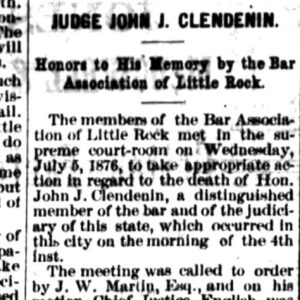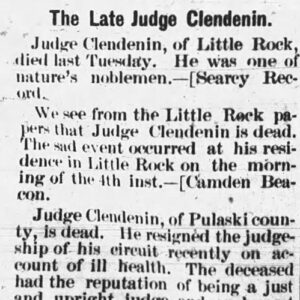calsfoundation@cals.org
John J. Clendenin (1813–1876)
John J. Clendenin was an influential lawyer and judge in Arkansas before and after the Civil War. He also served a short term as a member of the Reconstruction-era Supreme Court of Arkansas.
John Joseph Clendenin was born on September 2, 1813, in Harrisburg, Pennsylvania. Not much is known about his youth beyond the fact that to support his widowed mother, as well as his siblings, he worked as a clerk in a Harrisburg-area post office while also gaining some business experience. He also read the law for several years with prominent attorney (and future vice president) George Mifflin Dallas. He then clerked for future senator and secretary of war Simon Cameron.
In 1836, Clendenin made his way to Arkansas, where he became the private secretary to the state’s first governor, James Sevier Conway. While he moved south, he had apparently not abandoned all his northern ties, for there is evidence that he was one of the fewer than 300 stockholders in the Cumberland Valley (Pennsylvania) Railroad Company.
Clendenin married Mary Eliza Watkins around 1849, and the couple had three children.
The political ties he had developed working for Conway led to his election by the Arkansas General Assembly in 1840 as a judge on the state’s fifth circuit court. He was reelected in 1844, but he resigned in 1846 to accept a position as quartermaster in the U.S. Army. He left the army in 1848, and, returning to Little Rock (Pulaski County), he set up a private law practice with his brother-in-law, George C. Watkins. In 1849, he succeeded Watkins as the state’s attorney for the fifth circuit, a position which, under the state’s constitution, made him the ex officio state attorney general. In 1854, he was again selected to serve as fifth circuit judge. Clendenin remained in that role until 1863, when Union troops marched into Little Rock.
At that point, it appears that the judge accompanied those who moved the Confederate state government to a temporary capital in southwestern Arkansas at Washington (Hempstead County). Soon thereafter, Confederate governor Harris Flanagin dispatched Clendenin to Little Rock in what proved to be an unsuccessful effort to secure a peace agreement with the commanding officer of the Union forces in Arkansas. After the war, although he was ineligible for the general amnesty offered by President Andrew Johnson as a result of a pending federal lawsuit regarding the confiscation of his property, on July 7, 1865, Clendenin received an individual presidential pardon.
In August 1866, Clendenin was elected to a seat on the Arkansas Supreme Court. However, the court met only three times—in December 1866, June 1867, and December 1867—before it was abolished as a result of the Reconstruction Act of 1867. Under that legislation, the state was put under military rule, and only after a new constitution had been written and approved by the voters would the state be readmitted to the union. The new constitution was approved by voters in March 1868, and readmission came in June. In 1874, Clendenin was elected to the state’s Sixth Circuit Court, where he served until his death in 1876.
Clendenin’s life in the law led to his involvement in two of the state’s more bizarre political sideshows. Early in his career, in 1838, he was a member of the four-man team that prosecuted Speaker of the House John Wilson for the murder of fellow Representative Major Joseph Anthony in a December 1837 knife brawl on the floor of the General Assembly. While Wilson was ultimately acquitted, he was expelled from the General Assembly.
Later in 1874, shortly after having been elected to a seat on the state’s Sixth Circuit Court, Clendenin became involved in the governmental chaos that marked the end of the Republican battle known as the Brooks–Baxter War. When the ascension to the governorship of Augustus Garland was challenged by some Republicans, Clendenin, at Garland’s request, issued an arrest warrant for Edward Wheeler, V. V. Smith, and John Price, who were engaged in setting up an opposition government. It proved to be the first step toward shutting down the effort as Smith fled the state to escape the warrant, and the opposition crumbled.
Clendenin died on July 4, 1876, in Little Rock, and both he and his wife are buried in Little Rock’s Mount Holly Cemetery.
For additional information:
Hallum, John. Biographical and Pictorial History of Arkansas. Albany, NY: Weed, Parsons and Co., 1887.
“Judge John J. Clendenin.” Arkansas Gazette. July 6, 1874, p. 4.
“Judge John Joseph Clendenin.” Find a Grave.com. http://www.findagrave.com/cgi-bin/fg.cgi?page=gr&GRid=7749965 (accessed May 17, 2017).
Stafford, L. Scott. “The Arkansas Supreme Court and the Aftermath of the Civil War.” University of Arkansas at Little Rock Law Review 23.2 (2001): 355–407. Online at http://lawrepository.ualr.edu/cgi/viewcontent.cgi?article=1376&context=lawreview (accessed May 17, 2017).
William H. Pruden III
Ravenscroft School
 Law
Law Louisiana Purchase through Early Statehood, 1803 through 1860
Louisiana Purchase through Early Statehood, 1803 through 1860 John J. Clendenin Memorial
John J. Clendenin Memorial  John J. Clendenin Obituary
John J. Clendenin Obituary 




Comments
No comments on this entry yet.